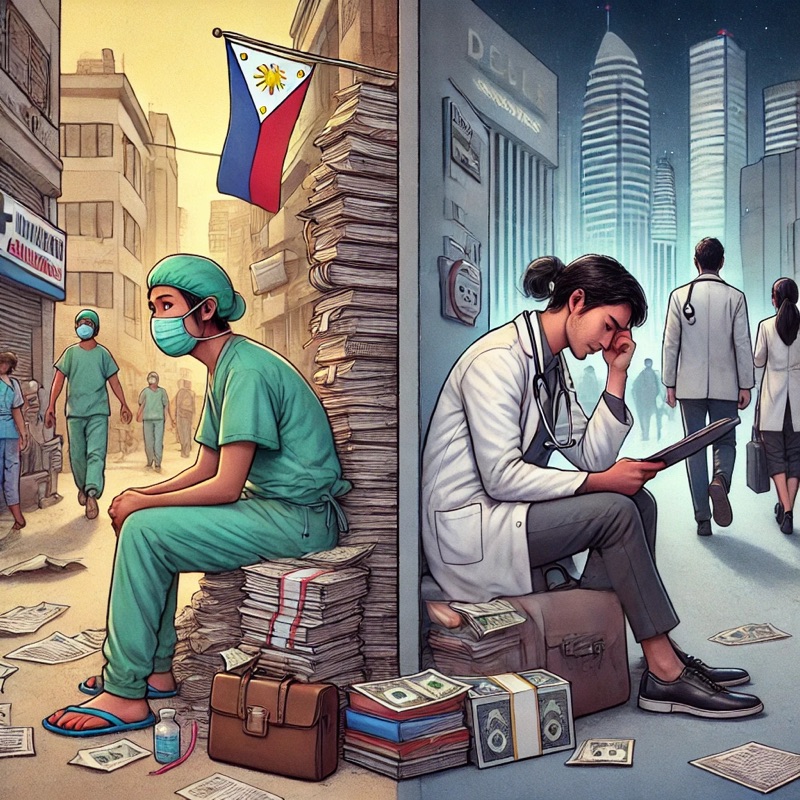The Financial Struggles of Doctors in the Philippines Overworked, Underpaid, and the Path to Doctorpreneurship
The Financial Struggles of Doctors in the Philippines Overworked, Underpaid, and the Path to Doctorpreneurship
By Nexus MD

Becoming a doctor in the Philippines is a lifelong commitment that demands years of intense study, sleepless nights, and an unwavering dedication to saving lives. The perception is that doctors live comfortably and earn well, but the truth is far from glamorous. Many Filipino doctors are overworked, underpaid, and struggling to make ends meet despite their years of training.
Meanwhile, their counterparts abroad earn significantly higher salaries for the same work, with better working conditions and financial stability. This stark contrast has driven many Filipino doctors to either migrate overseas or seek alternative income streams, leading to the rise of “doctorpreneurship” the fusion of medicine and business.
Let’s take a deep dive into the reality of a doctor’s financial struggles in the Philippines, compare it with the earnings of doctors abroad, and explore doctorpreneurship as a viable solution to achieving financial freedom.
The Harsh Reality Overworked and Undercompensated

The journey to becoming a doctor in the Philippines is expensive and time-consuming. A medical student spends at least 10 to 12 years in education and training
4 years of pre med
4 years of medical school costing around 500,000 to 2,000,000 pesos in total tuition fees
1 year of internship with minimal allowance if any
3 to 6 years of residency training with salaries ranging from 20,000 to 45,000 pesos per month
After all this effort, one would expect a rewarding career. However, the financial reality is disappointing.
Low Salaries in Public and Private Hospitals
A general practitioner earns around 300 to 500 pesos per consultation in private practice. If they see 10 to 15 patients a day, they make 3,000 to 7,500 pesos daily, which may sound decent but factor in clinic rent, taxes, and operational costs, and the take home pay significantly drops.
A resident doctor in a government hospital earns 20,000 to 45,000 pesos per month, despite working 48 to 100 hours a week, including 24 hour shifts.
A medical officer in a public hospital earns 40,000 to 60,000 pesos per month, but with overwhelming patient loads.
A specialist consultant earns more, but still struggles with the high overhead costs of private practice and delayed payments from health insurance companies.
Even with a stable hospital job, many doctors are financially stretched due to medical school loans, clinic expenses, and the high cost of living.
The Contrast How Much Do Doctors Earn Abroad
Let’s compare the salary of Filipino doctors to those practicing abroad.
United States A general practitioner earns an average of 1,200,000 to 1,800,000 pesos per month
Canada Family doctors make around 1,000,000 pesos per month
Australia General practitioners earn 800,000 to 1,500,000 pesos per month
United Kingdom NHS doctors start at 300,000 pesos per month, increasing with specialization
Middle East Doctors in Saudi Arabia or UAE earn between 400,000 to 1,000,000 pesos per month, depending on specialization
The vast salary difference is why many Filipino doctors leave for better paying opportunities abroad. A doctor in the Philippines working 100 hour weeks makes less than a doctor in the US working 40 hour weeks. The pay gap is undeniable.
The Rise of Doctorpreneurship A Path to Financial Freedom
Given the financial struggles in traditional practice, doctorpreneurship has emerged as a powerful solution for doctors to reclaim financial stability and professional autonomy.
Doctorpreneurship is the fusion of medical expertise and business innovation, allowing doctors to generate income beyond patient consultations. Here’s how doctors are successfully monetizing their skills
Opening Specialized Clinics
Doctors are shifting from general practice to niche markets, such as
Aesthetic and dermatology clinics
Wellness and anti aging centers
Mental health and psychiatric services
Sports medicine and rehabilitation centers
By offering high demand, high value services, these clinics provide better financial returns.
Establishing Diagnostics and Laboratories
Investing in diagnostic centers, such as laboratories, imaging centers x ray, ultrasound, CT scan, and mobile testing services, allows doctors to generate passive income.
Venturing into Telemedicine
Online consultations and subscription based telemedicine platforms enable doctors to reach more patients without the need for physical space. Many Filipino doctors now see international patients through telehealth, earning in US dollars while working from home.
Investing in Health and Wellness Products
Doctors are now launching their own brands of Nutritional supplements and vitamins
Medical grade skincare products
Health related mobile apps
These ventures allow doctors to scale their income without relying solely on consultations.
Creating Medical Education and Training Programs
Doctors with a passion for teaching are earning from Medical board review programs
CPD accredited workshops for fellow doctors
Online courses and webinars on public health topics
Medical education is a growing industry, and doctorpreneurs are capitalizing on it.
Real Estate and Business Investments
Some doctors venture into real estate clinic spaces, rental properties or franchising businesses as an additional income source. Diversifying income streams allows them to secure financial independence.
Final Thoughts: The Need for Change
Doctors in the Philippines deserve better. The reality of being overworked and underpaid pushes many to seek opportunities elsewhere, whether through migration or doctorpreneurship.
For those who choose to stay in the country, the solution is not to work more hours but to work smarter.
Doctorpreneurship is no longer an option it is a necessity for Filipino doctors who want financial freedom, work life balance, and a future where they are no longer undervalued.
If you are a doctor struggling with finances, it is time to think beyond consultations and hospital shifts. Leverage your expertise, embrace entrepreneurship, and build a career that allows you to thrive not just survive.
The future belongs to those who innovate. Will you take the leap?
Warm regards,
Nexus MD
Comments
Post a Comment